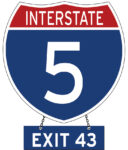 Editor’s Note: This is the 16th chapter in Volume 3 of Publisher and Editor Donald H. Harrison’s 2022 trilogy, “Schlepping and Schmoozing Along the Interstate 5.” All three books as well as others written by Harrison may be purchased from Amazon.com.
Editor’s Note: This is the 16th chapter in Volume 3 of Publisher and Editor Donald H. Harrison’s 2022 trilogy, “Schlepping and Schmoozing Along the Interstate 5.” All three books as well as others written by Harrison may be purchased from Amazon.com.
Schlepping and Schmoozing Along the Interstate 5, Volume 3, Exit 43 (Leucadia Boulevard): Ross Dress for Less
From the northbound Interstate 5, take the Leucadia Boulevard exit and turn right (east) to shopping center at the southwest corner of the intersection with El Camino Real. The store’s address is 1038 N. El Camino Real.


ENCINITAS, California — This Ross Dress for Less, like hundreds more of the “off-price” outlet, is part of the legacy of the late Stuart Moldaw, the son of a Jewish immigrant from the Pale of Russia.
Before Moldaw started Ross Dress for Less in 1982, he was successful as the founder of Pic-A-Dilly, a chain of stores that like Ross Dress for Less offered brand-name clothes at prices below those sold at department stores.
His success had led him into the world of political campaigns. In 1974, he accompanied his friend Walter Mondale, who then was eyeing a run for the American presidency, on a trip to Russia, where Mondale intended to burnish his foreign relations credentials.
In 2006, Moldow published A Life Story for My Grandchildren in which he related attending a performance with Mondale of the Bolshoi Ballet. They were seated in what had been the czar’s box. “Suddenly, it dawned on me where I was,” I wrote. “I started to laugh. I was embarrassing Mondale. He turned and said, ‘What is the matter with you?’ I tried to calm myself. I said, ‘I just want to tell you that this is a screwy world. My father [Joshua Moldaw] left this country with his parents, fleeing for their lives from a pogrom and here I am, his son, one generation later, sitting in the czar’s box at the Bolshoi. Can you believe that?’ I would have loved if my father lived long enough to see it.”
His father also would have been amazed at the financial success that Stuart made for himself. As an adult Stuart was an industrious and savvy worker, so unlike the way he was as a girl-and-car-crazy teenager. He went on in 1945 to serve on the transport ship U.S.S. Ulysses S. Grant, where he confronted serious antisemitism for the first time. A good ol’ boy from Tennessee berated another Jewish sailor named Marcus, telling him ‘Oh, you goddamn kike, you’ll end up being a yeoman in an office and not doing any real work.” Moldaw stopped chipping paint and told the bully, “Listen, you son of a bitch. I’m Jewish. I don’t like the way you are talking. I won’t stand for it.”
In the fight that followed, Moldaw and the Tennessean smashed each other’s heads against some concrete. Both ended up in sick bay to be patched up. Moldaw clearly had gotten the worst of it, but after that fight, “no one said anything deprecating about Jews” in his presence. “They knew I stood up for myself.” The hapless Marcus, on the other hand, did not fight back and his shipmates made his life miserable.
Moldaw’s rise through the ranks of retailers started after his graduation from Syracuse University in 1949. His first job was with Le Bon Marche in Lowell, Massachusetts, as an assistant on the men’s and women’s apparel floor. He was promoted to manager of the department. Next, he went to the G. Fox Department Store in Hartford, Connecticut, initially as an assistant buyer. After four years, he and his wife Phyllis moved to California where a job with Lerner Shops beckoned. They trained for the job in San Diego under a very smart merchant named Milton Silverman,” who lived in Coronado. After an assignment in Oakland, he was made district manager for all Lerner Shops north of Bakersfield.
In 1958, Moldaw went into business for himself, opening in strip centers dominated by drugstores and supermarkets a chain of stores called County Casuals. They featured “classic tailored styles” for “young mothers on limited budgets.” The chain eventually was purchased by the Melville Corporation, whose holdings included Thom McAn shoe stores.
Moldaw’s next enterprise was as a principal in U.S. Venture Partners. While participating in that company, Moldaw also ran Pic-A-Dilly, which later was purchased by Lucky Stores. Thereafter, Moldaw decided to start Ross Dress for Less, which he described as a larger version of Pic-A-Dilly, offering not only women’s clothing but “a full array of family apparel.”
From Bill Isaacson, who owned six Ross stores in Northern California, Moldaw purchased the small chain and added “Dress for Less” to the name. He then set about adding stores across the nation. There were more than 900 Ross Dress for Less stores by the time Moldaw died at age 81 in 2008.
As with Pic-A-Dailly, Ross Dress for Less was intended to offer bargains on brand-name merchandise.
“Department stores were bleeding manufacturers dry, asking for travel, freight, or advertising and markdown allowances, and then they charged the customer full price for the merchandise, Moldaw wrote in his memoir. “My idea was to offer the manufacturer a lower price, pay on receipt of the merchandise, and not ask for anything else. Then I would pass the value on to the customer and build market share.”
In 2006, the year Moldaw wrote the memoir with the help of writer Jeff McNish, Ross’s volume was “over $4 billion and will probably double in the next several years,” Moldaw predicted. “The company normally makes 4 or 5 percent after taxes. We are adding sixty to seventy stores a year. In addition to selling apparel, Ross now has departments selling things for the home: shoes, gifts, lingerie, accessories and toys.”
At the time of his writing, Ross employed 26,000 people across the nation.
Another of Moldaw’s companies was Gymboree, at which toddlers could learn how to “roll and tumble and climb” in an atmosphere of “music, brightly colored environments, and a lot of exchange among new parents.” At the time of Moldaw’s death, Gymboree Corporation had 585 locations.
Moldaw’s business successes led to contacts with a variety of Democratic politicians including Ted Kennedy, Jimmy Carter, and Bill Clinton.
In 1993, President Clinton appointed Moldaw as a delegate to the United Nations General Assembly, where he served under the direction of U.S. Ambassador Madeleine Albright. After his term was up, Moldaw accepted another appointment in 1996 as the chairman of the Commission on Presidential Scholars. Top high school students who received perfect scores on their Scholastic Aptitude Tests (SATs) received a small stipend to further their studies. Typically, designation as a presidential scholar paved the way for other scholarships.
During the years in Israel of Labor governments, Modaw was a strong supporter of the Jewish state. But when right-wing governments came to power, he soured on Israel and stopped contributing to Israel-oriented philanthropies.
“It is terribly upsetting that Palestinians are bombing and killing Israelis, he wrote. “However, I do not comprehend how the Israeli government could expand into the West Bank and call it by its biblical names, Judea and Samaria, and not see that as an act of provocation. Had that not happened, I believe the antagonism would not be as great. Yasir Arafat was not someone you could deal with, but Israel itself has contributed to much of the strife that has occurred.”
Instead of giving money to Israel, Moldaw supported various Jewish organizations. According to the Jewish News of Northern California (The J), these included Congregations Beth Am in Los Altos Hills and Congregation Emanu-El in San Francisco; the San Francisco-based Jewish Community Foundation; the Jewish Community Endowment fund; the Contemporary Jewish Museum; and the Taube-Koret Campus for Jewish Life in Palo Alto.
The Foundation he and his wife Phyllis formed also supported such general community organizations as the San Francisco Museum of Art, the Museum of Modern Art; the Moldaw-Zaffaroni Boys and Girls Club of East Palo Alto; the Eastside College Preparatory School; Communities in Schools; the Palo Alto Medical Foundation; the San Francisco Ballet and the public broadcasting station KQED.
He was the father to daughters Carol and Susan. The grandchildren for whom he wrote the memoir are Sarah and triplets, Stuart, Jack, and Bill.
*
Donald H. Harrison is publisher and editor of San Diego Jewish World. He may be contacted via donald.harrison@sdjewishworld.com
I LOVR YOUR STORE!! I have to go Every Tuesday for Senior Discount. I use to work at Lerners in Downtown San Diego,so dressings is MY THANG(HAHA) PLEASE KEEP UP the GREAT WORK! BLESS YOU and YOUR AMAZING TEAM !!